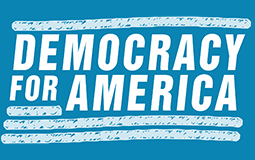Case Study
Raise the Minimum Wage

Democracy for America’s Raise the Minimum Wage campaign allows DFA supporters to create petitions asking their local government to raise the minimum wage. We spoke to Jay Henderson, a campaign manager at DFA, about the strategy of the campaign and the impact it’s had.
Before
Q: What had DFA done in the past regarding the minimum wage?
A: Democracy for America has endorsed previous minimum wage campaigns and supported candidates working to raise the minimum wage. Prior to using the YouPower landing page, Democracy for America collected and delivered petitions to increase the federal minimum wage.
Q: What made you decide to try a landing page campaign on YouPower?
A: In late 2013, we decided to partner with former Secretary of Labor Robert Reich to hold movie nights of his film “Inequality for All.” We thought this action provided several exciting opportunities:
- Focus our work around income inequality
- Partner with a prominent progressive ally
- Launch a national campaign using YouPower.
Whenever we hold movie nights we always want the attendees to take action. The trick is figuring out actions which can be relevant for the hundreds of parties taking place all across the country. YouPower allowed us to set default language about raising the minimum wage, but also allow our members to customize the petitions to properly reflect their communities.
The Campaign
Q: How did you publicize the campaign?
A: We provided all movie night hosts with a packet of instructions, including instructions for how to set up a YouPower petition around the minimum wage. We held training conference calls prior to and after the movie nights explaining how to use YouPower. We had Robert Reich encourage all of the attendees to start a YouPower petition during a live conference call on the day of the movie nights. Robert Reich also sent out emails to our general members with the link to start a petition.
Q: How many petitions have been created?
A: All told there were close to 564 minimum wage petitions created. These petitions varied from ones which gathered only a few
signatures to those with hundreds of signatures.
Q: Are you providing any tools or support to the people starting petitions?
A: Once members started the petition, we followed up and tried to connect them to a local minimum wage campaign as applicable. Depending on the location of the petition and the extent of local campaigns, we sent out emails to support the top performers and worked closely to get a victory. In a few cases we worked on a 1-on-1 basis with the petition creator to build their campaign.
Q: What challenges have you faced with this campaign?
A: The biggest difficulty was scaling to match the number of petitions. With over 500 petitions created and even more started, we tried to both provide broad support which applied to all petitions and also tailor our work to the particulars of each petition.
Q: What are the success stories? Are there city councils you never thought would be on board that have agreed increase the minimum wage?
A: We worked most closely and had the most success at the local level. With staff on the ground in Berkeley and Seattle, we concentrated most of our efforts on building upon the existing infrastructure there. Both of those situations are ongoing, but we’re particularly proud to have played a part in raising the minimum wage to $15. That said, we also tried to help some surprisingly successful campaigns, such as the ballot measures in Alaska.
Q: Tell us more about the Berkeley campaign.
A: In Berkeley, Democracy for America helped organize our members to support the city’s increase of the minimum wage to a living wage level. Berkeley Resident and DFA member David Fielder started a YouPower petition that received 534 signatures from Berkeley residents. DFA staff supported David by participating in coalition and planning meetings with local community partners, and helped recruit our members for a special City Council public forum, as well as three City Council meetings. Ultimately, the City Council voted to raise the minimum wage to $12.53 by 2016, and created a commission to draft a proposal on reaching a living wage in the city of Berkeley soon thereafter.b> DFA continues to work to support our members organizing for a living wage in Berkeley, which includes paid sick leave and a possible ballot initiative in 2016.
Next steps
Q: What’s next for this campaign?
A: Seeing the success of the minimum wage ballot measures, we will look to support new ones in 2015. The ongoing petitions create a perfect launching point to successfully help build and win all across the country.

